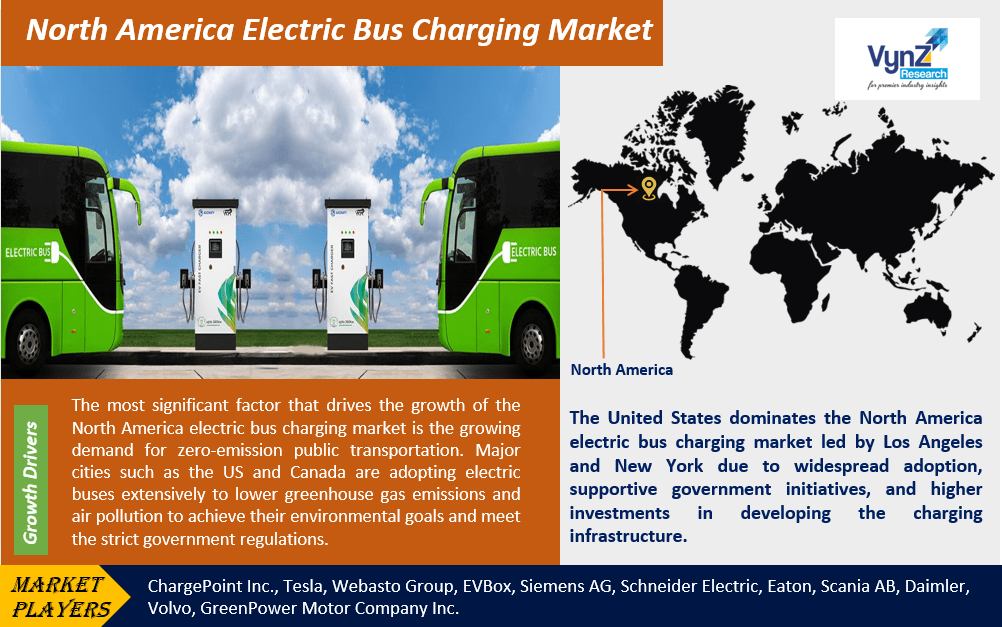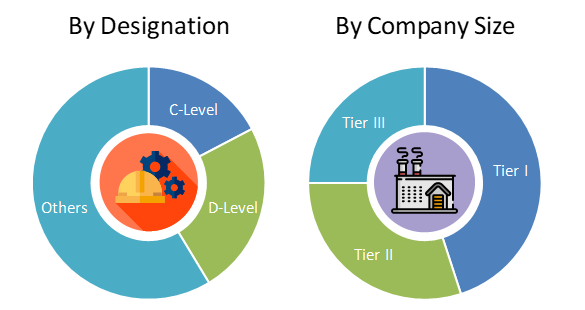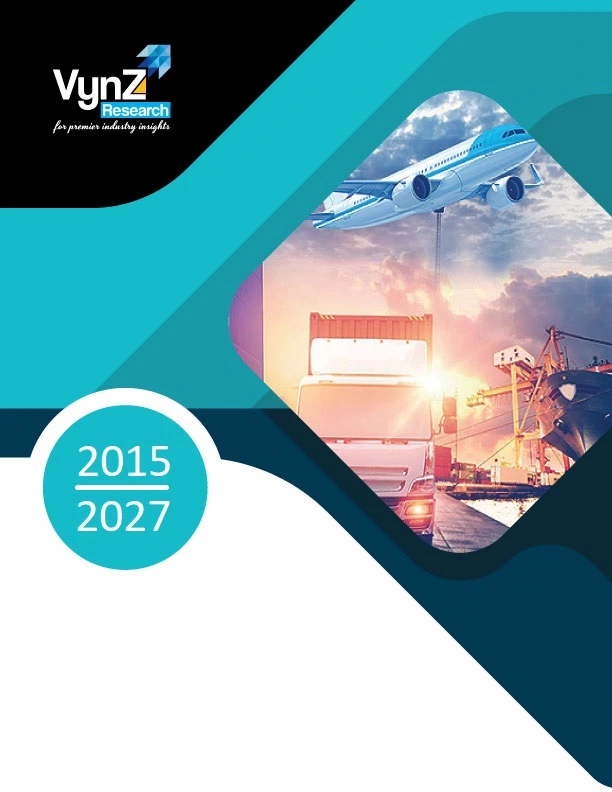Industry Overview
The North America Electric Bus Charging Market size was valued at USD 5.6 billion in 2023. It is likely to grow up to USD 10.2 billion by 2030 at a CAGR of 9.5% during the forecast period ranging between 2025 and 2030. The market growth is driven by the increasing investments by governments and private organizations in electric bus charging infrastructure. This is done to keep up with the ever-increasing number of electric buses plying on the road. This trend is especially noticed in the urban areas that have a large number of commuters.

Electric bus charging refers to a specific technology or mechanism that powers up the batteries of electric buses. The charging infrastructure includes duplicator systems, depot chargers, and wireless chargers. Electric buses are eco-friendly due to their zero tailpipe emissions. This reduces both air pollution and noise levels offering significant benefits such as cleaner and greener cities, lower the cost of operations due to zero reliance on fossil fuels.
North America Electric Bus Charging Market Report Coverage
|
Report Metric
|
Details
|
|
Historical Period
|
2018 - 2023
|
|
Base Year Considered
|
2024
|
|
Forecast Period
|
2025 - 2030
|
|
Market Size in 2024
|
U.S.D. 5.6 Billion
|
|
Revenue Forecast in 2030
|
U.S.D. 10.2 Billion
|
|
Growth Rate
|
9.5%
|
|
Segments Covered in the Report
|
By Charger, By Type, By Power
|
|
Report Scope
|
Market Trends, Drivers, and Restraints; Revenue Estimation and Forecast; Segmentation Analysis; Impact of COVID-19; Companies’ Strategic Developments; Market Share Analysis of Key Players; Company Profiling
|
|
Regions Covered in the Report
|
United States, Canada, California, New York
|
North America Electric Bus Charging Industry Dynamics
North America Electric Bus Charging Market Trends/ Growth Drivers:
Rising demand for zero-emission civic transport
The most significant factor that drives the growth of the North America electric bus charging market is the growing demand for zero-emission public transportation. Major cities such as the US and Canada are adopting electric buses extensively to lower greenhouse gas emissions and air pollution to achieve their environmental goals and meet the strict government regulations. Also, government grants and incentives promote adoption of electric buses for mobility, which also contributes to the market growth. More and more traditional buses that operate on diesel and other fossil fuels are being replaced by electric buses all over North America of late. This encouragement helps in meeting the sustainability goals of the country as well as addressing the growing concern over air pollution among people.
A surge in the deployment of electric buses and rise in the number of charging stations is also attributed to the growing need for advanced charging stations and a robust infrastructure, technological developments that promote faster charging and longer range and life, higher efficiency, rising prices of traditional fossil fuel, need to reduce operational costs, growing environmental awareness, and supportive federal funding programs to promote smart grid infrastructure.
North America Electric Bus Charging Market Challenges
High upfront cost of infrastructural setup
One of the most significant challenges faced by the North America electric bus charging market which is hindering its growth is the high cost of infrastructural setup. There is a lot of money involved with installing fast chargers which deters smaller transport agencies and cities with limited budgets to adopt this technology.
Furthermore, the continual need for repairs and upgrades to the existing electrical grid also involves a high amount of money, labor, and time. As a result, large number of companies and cities cannot support charging infrastructure at a larger scale. Then, there are also logistical issues, inadequate charging stations in rural regions, battery degradation, slow charging, and more that prevents widespread adoption and smooth growth of the market.
North America Electric Bus Charging Market Opportunities
Growing government incentives and support
A major growth opportunity offered to the North America electric bus charging market is the growing support from governments to promote adoption of electric buses and vehicles. They are also offering incentives and subsidies and tax rebates for such adoption and building a better charging infrastructure. These supportive initiatives by the governments help lower the upfront cost and make the transition of electric fleets more plausible and accessible for both private and public operators. Furthermore, the rising emphasis on green and smart cities, clean energy, and strategic collaborations between the government bodies and private agencies are presenting novel growth opportunities to the market.
North America Electric Bus Charging Market Segmentation
VynZ Research provides an analysis of the key trends in each segment of the North America Electric Bus Charging Market report, along with forecasts at the regional and country levels from 2025-2030. Our report has categorized the market based on Charger, Type and Power.
Insight by Charger
- On-Board Chargers
- Off-Board Chargers
The on-board charger category is more dominant due to higher sales volumes
According to the type of charger, the North America electric bus charging market is segmented into On-Board and Off-Board Chargers. Among them, the on-board charger category is more dominant due to higher sales volumes. This specific segment is expected to grow more during the forecast period due to widespread integration into electric buses and the flexible charging options at several locations.
Insight by Type
- Depot Charging
- Opportunity Charging
- Inductive Charging
The depot charging segment dominates due to its larger market share
The North America electric bus charging market is also divided by type into Depot Charging, Opportunity Charging, and Inductive Charging segments. Out of these, the depot charging segment is expected to dominate due to its larger market share. This is attributed to the rising preference by the private and public transport companies for overnight charging. It is more convenient and supports operations without affecting the logistics.
Insight by Power
- 50 kW
- 50–150kW
- 151–450kW
- 450 kW
The 50-kW segment dominates due to low cost
Based on the power, the North America electric bus charging market is categorized into less than 50 kW, 50–150kW, 151–450kW, and more than 450 kW. Out of these segments, the 50-kWsegment dominates due to the low cost and larger market share as well as its suitability and widespread adoption in electric buses with a shorter range and smaller fleets.
North America Electric Bus Charging Market: Geographic Overview
The United States dominates the North America electric bus charging market led by Los Angeles and New York due to widespread adoption, supportive government initiatives, and higher investments in developing the charging infrastructure.
Canada is a promising region due to its strong commitment towards zero-emission transportation. It is also contributed to the supportive government initiatives, higher investment in the development of charging infrastructure, and higher adoption of electric buses in major cities Toronto and Vancouver.
The stringent environmental regulations of California and better plans to increase the fleet of electric buses present growth opportunities. It is also attributed rising investment in infrastructural development and efforts and incentives offered to encourage clean energy.
The New York regions is also expanding due to stringent zero-emission regulations, expanding electric buses network, supportive government incentives and strategic collaborations to develop fast-charging stations.
Competitive Insights of North America Electric Bus Charging Market :
- ChargePoint Inc.
- Tesla
- Webasto Group
- EVBox
- Siemens AG
- Schneider Electric
- Eaton
- Scania AB
- Daimler
- Volvo
- GreenPower Motor Company Inc.
PRIMARY RESEARCH INTERVIEWS - BREAKDOWN





